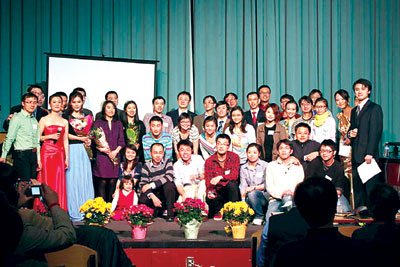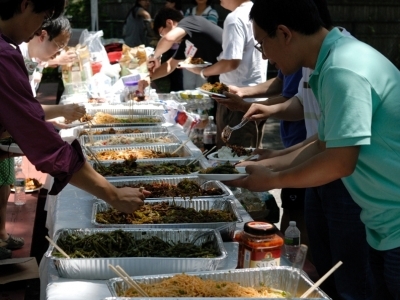波士顿清华校友会首任会长、 企业家 李诗颖教授(土木 36级)访谈
波士顿清华校友会首任会长、 企业家 李诗颖教授(土木 36级)访谈
波士顿有一位科学家、企业家、教育家,在工程研究、创业、教育等方面都有极为丰富的智慧和经验。他就是麻省理工大学教授、美国工程院院士 、波士顿清华校友会第一任会长李诗颖学长(土木 36级)。
李老从清华和MIT先后取得学士和博士学位后,在MIT任教几十年,同时成功创办数家企业;他以创新研究和转化两方面的成就,获选美国工程院院士 (“For original research on control valve stability, for innovative dynamic measurement instrumentation, and for successful entrepreneurial commercialization of his inventions”)
这个视频(及分段小视频)记录了李诗颖教授及家人2017年春接受波士顿清华校友会采访的主要内容。
Youtube Playlist https://www.youtube.com/playlist?list=PLY2tSgckT3YV7LmjwSwp8VrvK3ofiI6iE
腾讯视频专辑 http://v.qq.com/vplus/d5e983f1b54a6948083dce956f48556c/foldervideos/e6g000201qivgko
早期波士顿清华校友会的年会是什么形式?
“When I first came to Boston in 1942 during the 2nd world war, there were very few Tsinghua Alumni in Boston Area. Most of them are single, so we probably met couples of times every year, generally in a restaurant having dinner together. Later on, Professor Zhao Yuanren came to teach at Harvard University. They have a house in Cambridge which became our Chinese club. Mrs Zhao was very hospitable so everybody was welcomed. Those were our early days.
Later on, many Chinese officials working in New York also joined us. There was also a joined meeting with New York Tsinghua Alumni Association. We were given a tour to see the United Nations building, and invited to a Chinese restaurant owned by an alumnus.”
有什么当年改变人生轨迹的决定,如有机会现在会做出不一样的选择么?
“One’s career is not pre-determined. It changes with new opportunities coming along, without being able to foresee. If I were going to relive my life, I’m certain that it will be different from what actually happened. I didn’t know my strength and weakness when I was young. If I know that, I will choose jobs that I enjoy doing, even the reward may not be the best.”
您做出第一次创业决定时克服的最大障碍是什么?
“I didn’t have too much obstacle when I started the company. But once you started the company, there were all kinds of difficulties such as raising money. Generally, the starting up money would be used out before you reach a breakeven point. You will have obstacles of competing with much larger companies, and developing something that you cannot find customers or sales. Starting up is easy, but continuing on is much more difficult.”
简单介绍一下您的职业发展经历?
“After I graduated from MIT with a PhD degree in civil engineering, I felt I didn’t want to be a professor. I decided to go into the industry. So the first thing I did is to look up the Boston Globe-Employment Section. I got accepted by an architecture and engineering consulting firm. But afterwards I found my work very tedious, and I knew this is not the thing I like. So I decided to go back to MIT alumni placement office and asked if there’s an opportunity.
I got a position doing research in Dynamic Analysis and Control Lab. I found it much more interesting. I spent years to finish the research. Then my supervisor encouraged me to write a joined paper, and later on we successfully published two paper. After the publication I was invited to be a faculty at the department of mechanical engineering, as an assistant professor. I taught one class, and did other research work at that time. Because of the publication of the paper, I was invited to be a consultant in couples of companies. At that time, MIT gave a lot of freedom to the faculties. We had two days a week to be away doing our own works. I love building things. I showed my invention to a consulting company and they were very interested. They offered to buy the patent of my invention and I was so glad. Not only because my work was accepted, but also the money they paid me was about 7 times my annual salary of MIT.
At that time my brother also came to Boston and became an assistant professor at MIT. One of his design got a great amount of license fee from a company. We two have similar interest, so we put our money together and started a company, while still teaching at MIT. We hired another MIT graduate to do the operation, and both of us were doing design works. We went very well and got customers to buy our products. We reached a breakeven point quickly. After a few years we felt difficult to run the company and work at MIT at the same time, so we sold the company. We focused on teaching and research, and later on became professors.
At that time, we were imaging what we would do after retirement. So we decided to start a second company. We used the money we got from the first company as the seed money to start the second company. We started doing our products. After two to three years we ran out of our seed money. A person from Wall street invested us and put some money into the company, but after a couple of years the money was used up again. We got a second investment. Then in 1975, I took an early retirement from MIT and focused on the company. After one year, the company was at a good place, and started growing quickly. Then in 2001, I reached 85 years old. As we were aging, we decided to sell the company.
With all those years I’ve been away from home, I have to thank my wife for keeping a nice home and being a good companion.”
视频摄制:郭巍(波士顿清华校友会志愿者,热能07级)
访谈主持:庄晓丹 (波士顿清华校友会董事/会长,电子01级)
文字整理:仇沛然 (波士顿清华校友会志愿者,建筑10级)
详见视频列表:
Youtube Playlist https://www.youtube.com/playlist?list=PLY2tSgckT3YV7LmjwSwp8VrvK3ofiI6iE
腾讯视频专辑 http://v.qq.com/vplus/d5e983f1b54a6948083dce956f48556c/foldervideos/e6g000201qivgko
波士顿清华校友会 http://tsinghua-boston.org
2017.7.26
Related Posts
-
 04/02/2011,波士顿清华校友会庆祝母校百年华诞联欢晚会
No Comments | Feb 10, 2012
04/02/2011,波士顿清华校友会庆祝母校百年华诞联欢晚会
No Comments | Feb 10, 2012 -
 TAB Talks 11 – 远程医疗 – 如何让高品质的医疗服务人人可及?
No Comments | Feb 21, 2021
TAB Talks 11 – 远程医疗 – 如何让高品质的医疗服务人人可及?
No Comments | Feb 21, 2021 -
 [09/07/2014] 清华校友 2014 Summer聚会暨迎新活动 Sun 9/7 at Arsenal Park
No Comments | Aug 22, 2014
[09/07/2014] 清华校友 2014 Summer聚会暨迎新活动 Sun 9/7 at Arsenal Park
No Comments | Aug 22, 2014 -
 TAB Talks 35 – 通货膨胀与华人养老规划
No Comments | Aug 24, 2021
TAB Talks 35 – 通货膨胀与华人养老规划
No Comments | Aug 24, 2021
